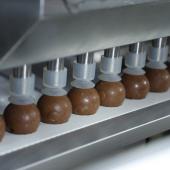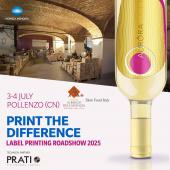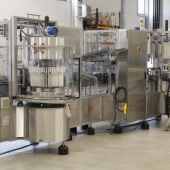Coffee and tea for all
ACMA is Coesia Group’s point of reference for consumer goods packaging. At Host 2015, it presented its coffee and tea systems, with an extensive catalog of machinery for primary and secondary packaging. At center stage are the latest models of the Qi capsule-filling range and the flowpacker Miniwrap, as well as Tecnomeccanica solutions for designer teas.
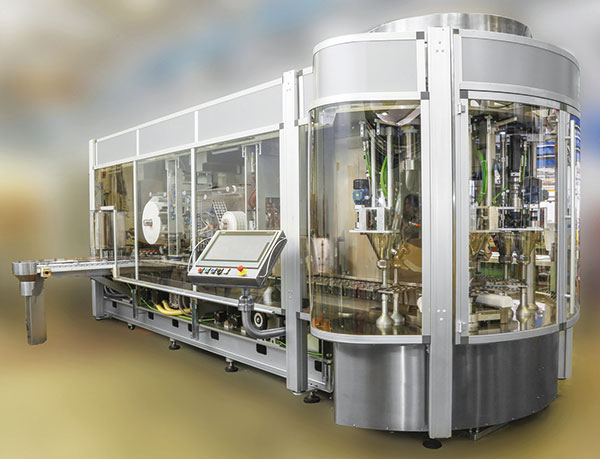
The coffee capsule sector is growing by double digits, and sector players are investing massive amounts in developing new products. The added value in service guaranteed by the right capsule-machine system can prove highly profitable. At the same time, the market is complicated by a “me too” explosion of new operators and solutions, facilitated by the expiration of a number of important patents. This has led to a proliferation of capsule-substitutes, which sometimes rely on less than cutting-edge, closed systems, and which raise demand.
In this field, it’s not hard to discern the central role of packaging, and consequently of packaging technology suppliers, which - in this case more than ever - play a hand in a product’s success. This was demonstrated at the last edition of Host (Fiera Milano, 23-27 October, 2015). At the event, which gathered over 2,000 exhibitors and over 150,000 visitors from around the world, ACMA presented a series of outstanding update for packaging coffee and tea, in capsules and bags. ACMA’s tea and coffee specialists spoke with us about them a little.
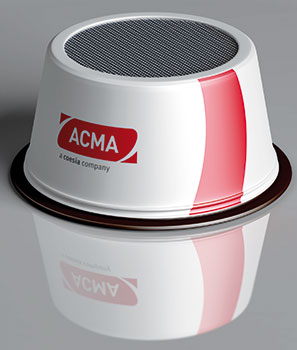
Consumption of coffee in capsules continues to grow. What are the global market trends? Which targets, in terms of quality and shares, has ACMA set itself?
In truth, the coffee capsules market is one characterized by lively growth and high added value, in which the packaging is the product, and so the technology supplier plays a crucial role. For this reason, we went for it, knowing that we have much to offer, both as ACMA, and, more generally, as Coesia. Indeed, machine builders are being asked to produce systems that are faster, guarantee maximum efficiency and optimize consumption of material and energy. We have relationships with the sector leaders thanks to the unique characteristics of our machines and the strength of a group that guarantees accessibility and assistance worldwide. And that’s not to forget another decisive factor: ACMA now offers an entire range of capsule-fillers to meet the needs of operators with vastly different productivity and market requirements, while also guaranteeing the necessary integration for end of line, capsule packaging, cartoning, etc.

After the launch of the Qi350 capsule-filler, now you are offering a significant integration of the range. What are the features? And for which sorts of requirements?
Thanks to major efforts to redesign the mechanics, electronics and main components, the new Qi 500 guarantees superior performance all around. The independent dispensers guarantee even more precise weight check; the patented vacuum system operates directly in the machine, reducing residual oxygen inside the capsule to less than %1, extending the product’s shelf life. Qi is also preset for the use of various capsule closure systems, based not only on thermoforming but also on pulses. Most importantly, it is designed to minimize consumption of material, for example that used to seal the top of the capsule, with a scrap reduction of 50-80%. As for the Qi800, which is our fastest capsule-filler (16 tracks, 800 cpm), not only does it top the ranking in productivity, but it is also extremely reliable and robust, and guarantees accurate production control and superior product quality.
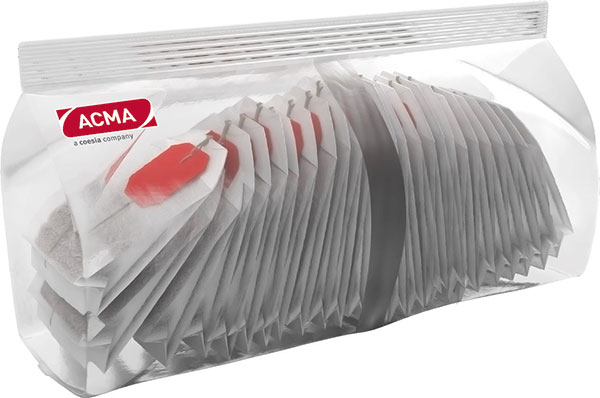
You’ll also be launching a machine for packaging capsules that are not self-protected at Host 2015…
Miniwrap is an alternative to classic flowpacks. In pursuing the basic goal of saving on material, we designed a horizontal machine that “wraps” the product. It doesn’t place it in a tube, like a flowpack, but wraps it, making use of a technology that we at ACMA know well: confectionery wrapping. There are many significant advantages. In addition to creating a different kind of packaging, 30% is saved in wrapping material, with an immediate cost reduction and additional saving during the waste disposal stage. Moreover, the space that has to be filled with nitrogen has been reduced (and therefore also gas consumption), while operational speed has been doubled. The Miniwrap reaches 200 pieces/min, compared to the 100 of classic vertical machines. These characteristics guarantee significant savings, which, given the importance of the price factor, represents a major competitive advantage.
We’ve talked about optimizing consumption and waste reduction... How big of a role does sustainability play in designing your packaging systems?
The entire coffee industry is making efforts on multiple fronts to deal with the problem of post-consumption disposal of the capsules. In the meantime, the single serving packaging is gaining ground in the market.
We are therefore confident in a progressive evolution of the capsule towards eco-compatibility, and, for our part, we are contributing in various ways. In addition to supplying our customers with patented technologies for separating coffee residue from the used container, making it recyclable, we are also working on efficiency. Our machines enable significant savings on scrap material, electricity and inert gasses.
Coesia’s offer is very extensive. Could one foresee a technology “transplant” from tea packaging to coffee?
Absolutely. While coffee dispensing has been developed right here at ACMA, everything to do with creating synergies between mechanical design and materials processing is up to the knowhow of the various Coesia Group subsidiaries.
Synergy is the order of the day also among various fields of application: in order to create self-protected capsule cartoners, for example, we relied on our knowhow in the tea and tobacco sectors. An innovation developed for one application generally translates to a competitive advantage for all the Group’s business, and also offers something in terms of marketing. In addition to coffee capsules, we now produce tea in capsules – a niche fed by the brewers themselves, who wish to offer other beverages as well – or broth… But we can also do the opposite: package coffee in bags, to be used as an infusion. In fact, Tecnomeccanica has developed a solution that integrates the now established T2 technology with special upgrades for the coffee sector. It is equipped with a dispenser modified for treating the product, which compared to tea leaves presents different weaknesses, due to a greater tendency to disperse during production. For this reason, in the coffee version, the T2 also has an innovative system for cleaning the bag, guaranteeing a cleaner final packaging with less product wastage.
As for tea, the T4 has recently received a technological upgrade aimed at enhancing its performance, from 250 to 300 bags per minute.
Like the T2, T4 can be integrated with various secondary packaging units, including for packaging ten-bag “micro-boxes”, a solution that guarantees a 50% saving on the most common box types.














